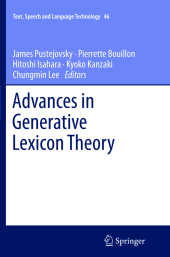 Neuerscheinungen 2015Stand: 2020-02-01 |
Schnellsuche
ISBN/Stichwort/Autor
|
Herderstraße 10
10625 Berlin
Tel.: 030 315 714 16
Fax 030 315 714 14
info@buchspektrum.de |

Pierrette Bouillon, Hitoshi Isahara, Kyoko Kanzaki, Chungmin Lee, James Pustejovsky
(Beteiligte)
Advances in Generative Lexicon Theory
Herausgegeben von Pustejovsky, James; Bouillon, Pierrette; Isahara, Hitoshi; Kanzaki, Kyoko; Lee, Chungmin
2013. 2015. viii, 488 S. 235 mm
Verlag/Jahr: SPRINGER NETHERLANDS; SPRINGER 2015
ISBN: 9400795866 (9400795866)
Neue ISBN: 978-9400795860 (9789400795860)
Preis und Lieferzeit: Bitte klicken
This book offers papers addressing models of linguistic composition from a Generative Lexicon perspective, showing how GL has developed to account for a range of linguistic phenomena, including argument alternation, polysemy, discourse phenomena and metaphor.
This collection of papers takes linguists to the leading edge of techniques in generative lexicon theory, the linguistic composition methodology that arose from the imperative to provide a compositional semantics for the contextual modifications in meaning that emerge in real linguistic usage. Today´s growing shift towards distributed compositional analyses evinces the applicability of GL theory, and the contributions to this volume, presented at three international workshops (GL-2003, GL-2005 and GL-2007) address the relationship between compositionality in language and the mechanisms of selection in grammar that are necessary to maintain this property. The core unresolved issues in compositionality, relating to the interpretation of context and the mechanisms of selection, are treated from varying perspectives within GL theory, including its basic theoretical mechanisms and its analytical viewpoint on linguistic phenomena.
Chapter 1: Introduction .- Chapter 2: Type Theory and Lexical Decomposition, James Pustejovsky .- Chapter 3: A Type Composition Logic for Generative Lexicon, Nicholas Asher and James Pustejovsky .- Chapter 4: Lexical Representation, Co-composition, and Linking Syntax and Semantics, Robert D. Van Valin, Jr .- Chapter 5: The Telic Relationship in Compounds, Christian Bassac and Pierette Bouillon .- Chapter 6: Metonymy and Metaphor: Boundary Cases and the Role of a Generative Lexicon, Sabine Bergler .- Chapter 7: Spanish Clitics, Events and Opposition Structure, José M. Casta¤o .- Chapter 8: Adjective-noun Combinations and the Generative Lexicon, Irena Draskovic, James Pustejovsky and Rob Schreuder .- Chapter 9: Combination of the Verb Ha- ´Do´ and Entity Type Nouns in Korean, A Generative Lexicon, Seohyun Im and Chungmin Lee .- Chapter 10: Generative Lexicon Approach to Derived Inchoative Verbs in Korean, Yoon-shin Kim and Chungmin Lee .- Chapter 11: Degree Vs. Manner Well : A Case Study in Selective Binding, Louis McNally and Christopher Kennedy .- Chapter 12: V-concatenation in Japanese, Kentaro Nakatani .- Chapter 13: Change of Location and Change of State, Chungmin Lee .- Chapter 14: Event Structure and the Japanese Indirect Passive, Naoyuki Ono .- Chapter 15: Developing a Generative Lexicon Within HPSG, Toni Badia and Roser Sauri .- Chapter 16: Purpose Verbs, Christiane Felbaum .- Chapter 17: Word Formation Rules and the Generative Lexicon: Representing Noun-to-Verb Versus Verb-to-Noun Conversion in French, Fiammetta Namer and Evelyne Jacquey .- Chapter 18: Boosting Lexical Resources for the Semantic Web: Generative Lexicon and Lexicon Interoperability, Nicoletta Calzolari, Francesca Bertagne, Alessandro Lenci and Monica Monachini .- Chapter 19: Automatic Acquisition of GL Resources, Using an Explanatory, Symbolic Technique, Vincent Claveau and Pascale Sébillot .- Chapter 20: The Semi-generative Lexicon: Limits on Productivity, Ann Copestake


